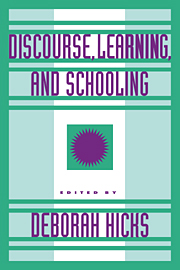Book contents
- Frontmatter
- Contents
- List of Contributors
- Acknowledgments
- 1 Introduction
- Part I Classroom discourses
- 2 Going for the zone: the social and cognitive ecology of teacher–student interaction in classroom conversations
- 3 Shifting participant frameworks: orchestrating thinking practices in group discussion
- 4 Contextual inquiries: a discourse-oriented study of classroom learning
- Part II Literacy, psychology, and pedagogy
- Part III Discourse and literacies
- Afterword
- Index
4 - Contextual inquiries: a discourse-oriented study of classroom learning
Published online by Cambridge University Press: 03 May 2010
- Frontmatter
- Contents
- List of Contributors
- Acknowledgments
- 1 Introduction
- Part I Classroom discourses
- 2 Going for the zone: the social and cognitive ecology of teacher–student interaction in classroom conversations
- 3 Shifting participant frameworks: orchestrating thinking practices in group discussion
- 4 Contextual inquiries: a discourse-oriented study of classroom learning
- Part II Literacy, psychology, and pedagogy
- Part III Discourse and literacies
- Afterword
- Index
Summary
The interpretation of meanings cannot be scientific, but it is profoundly cognitive.
M. M. BakhtinAs Courtney Cazden has stressed in her contribution to this volume, the work of L. S. Vygotsky has profoundly influenced educators' study of classroom learning and teaching, particularly in the area of classroom language use. Cazden points out that different educators, particularly writing researchers, have interpreted Vygotsky's work differently, often drawing quite different conclusions from the “same” pages in the collections of writings entitled Mind in Society (1978) and Thought and Language (1986) [or Thinking and Speech (1987)]. However, regardless of these differences of interpretation, the sociocultural psychology envisioned by Vygotsky has led to new ways of looking at teaching and learning. The sociocultural contexts in which teaching and learning occur are now widely considered critical to learning itself; indeed, learning is viewed as culture and context specific (Moll & Dworin, this volume; Scribner & Cole, 1981). Educational researchers working across a wide range of subdisciplinary areas have begun to take quite seriously an underlying premise in Vygotsky's work: that children's cognitive work takes place in a social dimension before this same activity occurs internally. The Piagetian metaphor of the lone child interacting with an objective, logical world, struggling to overcome her initial egocentrism and irrational thought, has given way to an image of a socially responsive child participating in recurrent joint activity mediated by the uniquely human means of communication: language.
Information
- Type
- Chapter
- Information
- Discourse, Learning, and Schooling , pp. 104 - 142Publisher: Cambridge University PressPrint publication year: 1996
Accessibility standard: Unknown
Why this information is here
This section outlines the accessibility features of this content - including support for screen readers, full keyboard navigation and high-contrast display options. This may not be relevant for you.Accessibility Information
- 57
- Cited by
